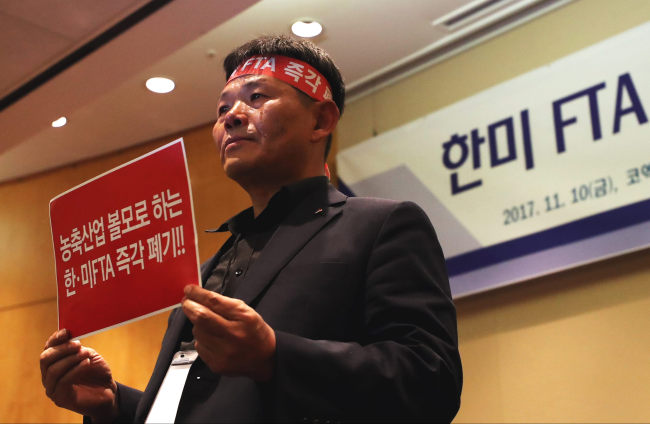Angry protesters disrupt public hearing on KORUS FTA

Yonhap | 10 November 2017
Angry protesters disrupt public hearing on KORUS FTA
By Kim Eun-jung
South Korea held a public hearing on the free trade agreement (FTA) with the United States on Friday to collect opinions from different circles, but it was disrupted by angry farmers and livestock breeders who claimed massive damage from the market opening.
At the hearing the Ministry of Trade, Industry and Energy unveiled an economic feasibility study on the renegotiation of the five-year-old deal, known as the KORUS FTA, which was conducted by three state research institutes.
The study showed that additional opening of the market following a possible amendment the KORUS is not likely to have a visible impact on the South Korean economy because the two countries have already scrapped tariffs in many sectors.
A low-level FTA would increase 0.0004 percent of the real gross domestic product (GDP) in South Korea and contribute to US$12 million in terms of consumer benefits, while a high-level FTA would add 0.0007 percent to the real economy and improve the welfare of local consumers by $24 million, the joint study said.
Real GDP measures the value of finished goods and services adjusted for inflation.
The Korea Institute for International Economic Policy (KIEP), the Korea Institute for Industrial Economic & Trade and the Korea Rural Economic Institute jointly conducted the study.
"The number of remaining items are limited and tariff levels are already low, so an additional opening of the manufacturing sector is not expected to produce any marked fallout," Kim Young-gui, a researcher at KIEP, said during the hearing held at the Convention and Exhibition Center in southern Seoul. "The macroeconomic effects could rise if the two sides abolish or lower nontariff barriers and adjust other sectors."
The joint study didn’t disclose detailed figures on each sector due to worries it would reveal South Korea’s strategies before entering full-fledged renegotiations with the U.S.
The study said the FTA has expanded trade and improved market access between the two nations.
The findings said South Korea’s imports from the U.S. edged down 0.8 percent from 2012, while shipments to the U.S. rose 5.3 percent.
The U.S. share of the Korean market has risen from 8.3 percent in 2012 to 11.1 percent in the first half of this year, while the corresponding figure for South Korea went up from 2.6 percent to 3.1 percent, it noted.
During the hearing, local farmers and stockbreeders said the government’s feasibility study is "unilateral" and "superficial," arguing it didn’t reflect the damage they have suffered over the past five years.
When it was stated that KORUS had produced "mutually beneficial outcomes," an angry farmer with a red headband hurled eggs to the stage and shouted, "Don’t lie ! Scrap KORUS FTA immediately !"
"Total trade with the United States has grown, but trade deficits in livestock products have increased every year. The KORUS FTA has taken the Korean agriculture industry hostage," Kim Hong-kil, the chief of Korean beef association, said. "Why don’t you tell people the truth ?"
The protesters urged the government to stand firm against any U.S. demands for a further lowering of tariffs on agricultural products, saying such a move would devastate the farming sector.
"We can’t surrender a grain of rice or a slice of meat," Kim said.
Kang Sung-chun, vice trade minister, said the government will bear in mind concerns of the agricultural industry when sitting down at the negotiating table with their U.S. counterparts so as not to lower tariffs on the sector.
"The government is steadfast in the position of not allowing the further opening of (the agriculture and livestock industries)," said Kang, surrounded by angry protesters, who tore down the banner on the stage and called for an outright cancellation of the hearing.
Although the meeting was scheduled to run for two and a half hours to hear opinions from various industrial circles, it only lasted 20 minutes due to vocal protest from dozens of farmers and stockbreeders.
The trade ministry said it will separately answer questions in written form and continue to meet with various stakeholders to come up with better strategies. It also said it will consult with the agriculture ministry to hold a separate meeting with representatives of agriculture and livestock industries as soon as possible to collect their opinions.
In a parliamentary audit last month, agriculture minister Kim Young-rok said "there’s no more room" in terms of giving more on the agriculture sector during the FTA talks, stressing rising deficits with the U.S.
South Korea’s agricultural goods and meat exports to the U.S. reached US$716 million last year while imports stood at $6.9 billion. The country’s trade deficit with the U.S. in the sector reached $6.14 billion in 2016, according to the farm ministry.
The trade ministry made clear it will reflect the opinions of all sides when crafting its strategy and will notify parliament of its intention to renegotiate the deal within the month. This process will wrap up the domestic procedures needed for opening talks.
The U.S. administration has to send a letter notifying Congress that it intends to launch KORUS FTA negotiations in 90 days. It must also hold public hearings and disclose its goal 30 days prior to official talks.





